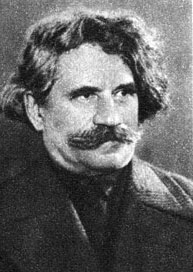Sergei Sergeyev-Tsensky
| Sergeyev-Tsensky | |
|---|---|
 |
|
| Born | September 30 [O.S. September 18] 1875 Preobrazhenskoye, Rasskazovsky District, Tambov Governorate, Russian Empire |
| Died | August 25, 1958 (aged 82) |
| Occupation | Writer and academician |
| Genre | short stories, novels |
| Literary movement | Modernism |
| Notable works | Russia's Transfiguration |
Sergei Nikolayevich Sergeyev-Tsensky (Russian: Серге́й Николаевич Сергеев-Ценский, September 30 [O.S. September 18] 1875 – August 25, 1958) was a prolific Russian and Soviet writer and academician. According to the opinion of Sergei Sossinksy, although "Sergeyev-Tsensky does not belong to Russia's top classical authors, he might have [been] if he had not had the misfortune of living half his life under Communist rule."
Sergei Sergeyev was born on September 30 [O.S. September 18] 1875, in the village of Preobrazhenskoye, Rasskazovsky District, Tambov Governorate. His father was a teacher and a retired veteran of the Crimean War of 1853–1856. At four, Sergeyev learned how to read and at five he already knew by heart many poems by Pushkin and Lermontov, as well as Krylov's fables, beginning to write his own poems at seven. At this time, his family had moved to Tambov where Sergei's father received a post in the government.
It was reported that Sergeyev "was fascinated by Russian translations of the Iliad and the Odyssey and read them avidly [and] at school, rewrote a scene from Boris Godunov, adding rhymes to Pushkin's blank verse, and was taken to task by the literature teacher for trying to outdo the great poet" and that when he wrote a short story at home, "his father threw into the fire, saying that prose writing was even more difficult than poetry and he was not ready for it yet."
When his parents died, Sergeyev studied at a teacher-training college, graduating in 1895 and then worked as a teacher in different towns of Russia until 1904, when the Russo-Japanese War broke out and he was drafted into the army, where he spent two years.
He published his first works in 1898, and his first book Thoughts and Dreams in 1901. The latter contained poems with strong civic undertones.
...
Wikipedia
